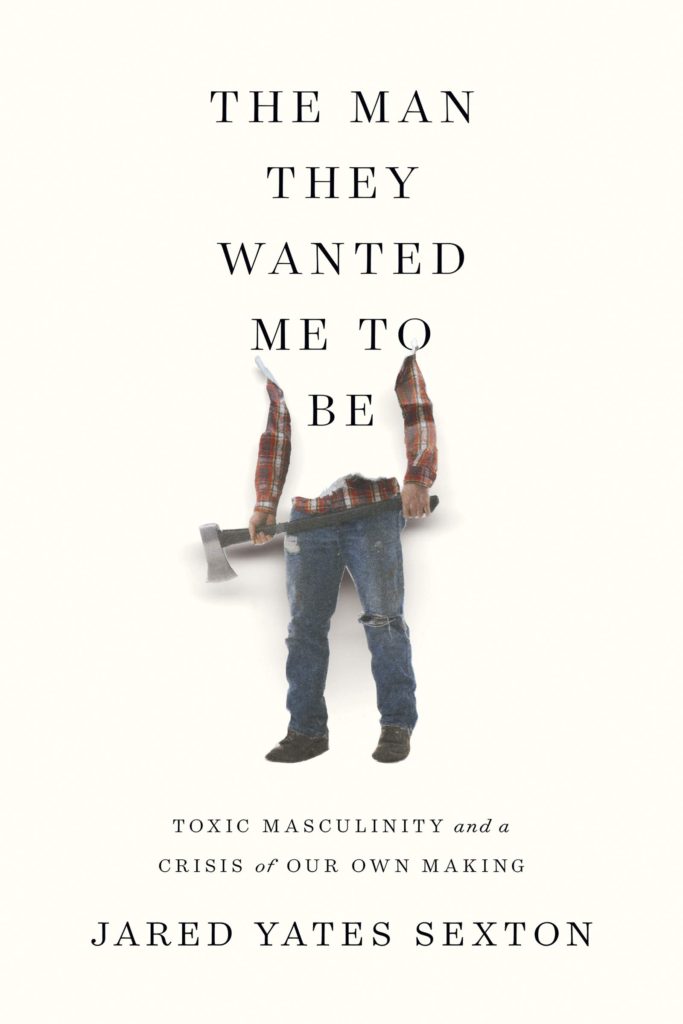The Man They Wanted Me to Be:
Toxic Masculinity and a Crisis of Our Own Making
By Jared Yates Sexton
Reviewed by Kristy Dolson.
I was surprised to learn, not that long ago, that November 19 is International Men’s Day: a day to focus on men’s health, improve gender relations, highlight male role models, and promote positive expressions of masculinity. Much earlier this year, I had asked a male colleague to recommend male feminist authors. His first recommendation was Jared Yates Sexton’s The Man They Wanted Me to Be: Toxic Masculinity and a Crisis of Our Own Making. I thought it was a great fit for the IMD mission statement. Also, it is a must-read for anyone wishing that the current socio-political climate (especially in North America) were different for both men and women.
This book is part memoir of a poor white boy forgotten by his father and part cultural analysis of a forgotten American town left behind by the rapid shift to a digital, globalized economy. In his childhood, Sexton’s grandfather provided one shining example of positive masculinity in a world ruled by male tyrants and submissive women. But his grandfather’s kindness and opposition to accepted male behavior was not enough to save Sexton from an adulthood fueled by alcohol and depression. On the edge of suicide, he reluctantly agreed to see a therapist and, over the course of many years of continued therapy, study, and introspection, he wrote this book to highlight white patriarchal masculinity and how it is failing everyone. Especially for those that have been forgotten by the powerful, it is a lie that is contradictory and dangerous to the world.

I sympathized greatly with Sexton. When he wrote about growing up different in a small town and discovering the internet, it felt like he was writing about my adolescence. The internet in the 1990s acted as a gateway to safe havens where strangers could gather and talk about their hobbies without fear of the consequences they would have faced in the outside world. As someone who also grew up in a small town with a lot of unique and interesting hobbies, this deeply resonated with me. Unfortunately, the internet did not remain untouched for long, as hypermasculine online harassers (a.k.a. trolls) soon infiltrated and took over. This was the beginning of toxic online culture, which we are still grappling with today.
Sexton goes back and forth a lot between telling his personal story and recounting how it fits into the larger socio-political picture of the USA in the 2010s leading up to the 2016 election. The book is divided into conventional chapters and more or less follows a linear narrative, beginning in childhood and moving forward until it reaches Sexton’s current state. It is written in a very intimate and personal tone – solemn but hopeful – purposefully constructed to make the author vulnerable as a model to others who may also be seeking to break the cycle of toxic masculinity. The conversations he had with his loved ones are candid and moving. He supports his experiences and opinions with studies and research that are referenced at the end of each chapter to encourage readers to do further research on their own.
This whole book acts as a lightning rod for toxic white masculinity. Sexton lays out what it is and what it generates when left unchecked. As a journalist who carefully followed the 2016 election campaign, he felt it was necessary to counter the growing unrest and violence that swept over America in the run up to and election of Donald Trump – a man who fueled and enabled the worst aspects of toxic male culture. Those internet trolls who only felt safe to unleash their hatred from behind a screen – Trump gave them the legitimacy they craved to air their opinions in the broad light of day. In the four years of Trump’s presidency, we have seen egregious abuses of power, heard shameless lies, and witnessed mass riots and protests in response. These reviews are submitted a month in advance, so I have no way to know who will win the election, but I sincerely hope that it is Joe Biden. Biden is a man like Sexton’s grandfather – old and white and male – but unlike Trump, he shows compassion and demonstrates a willingness to change that benefits more than the one percent.
Regardless of who wins the presidential election this month, change is made by taking many small steps over time. For Sexton, it took years, and it will take years more to see greater change in society – if any at all. Since November is the month to highlight positive male role models, I submit Jared Yates Sexton and his story of personal and cultural struggle. I hope it inspires more people to make change in their own thoughts and lives.
The Reviewer
Kristy Dolson lived in South Korea for five years before taking a year off to travel, read, and spend time with her family in Canada and Australia. She holds a Bachelor of Education and has returned to Gwangju, where she splits her time between teaching at the new Jeollanamdo International Education Institute and reading as much as she can.



